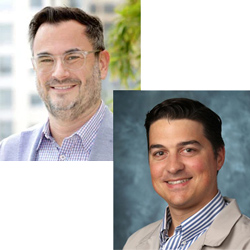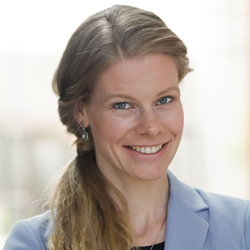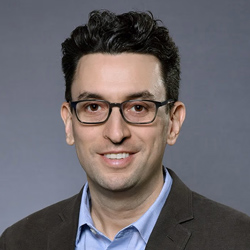Events
Past Event
WED@NICO WEBINAR: Lightning Talks with Northwestern Fellows and Scholars!
Northwestern Institute on Complex Systems (NICO)
12:00 PM
Details

NICO is hosting a lightning talk seminar each term as a part of our Wednesdays@NICO seminar series. Northwestern graduate students and postdoctoral fellows are invited to participate. To sign up for future lightning talks, please visit: https://bit.ly/2lRqSXK
Webinar:
Zoom link: https://northwestern.zoom.us/j/98719696231
Passcode: nico
Speakers:
Ifeoma Ozodiegwu - Postdoctoral Fellow, Feinberg School of Medicine
Chilochibi Chiziba - Research Assistant, Feinberg School of Medicine
Manuela Runge - Postdoctoral Fellow, Feinberg School of Medicine
David Sabin-Miller - Ph.D. candidate, McCormick School of Engineering
Yanxuan Shao - Ph.D. student, Weinberg College of Arts and Sciences
○ Ifeoma Ozodiegwu - Postdoctoral Fellow, Feinberg School of Medicine, Northwestern University
○ Chilochibi Chiziba - Research Assistant, Feinberg School of Medicine, Northwestern University
Title: Urban-rural differentials in the determinants of malaria transmission in Nigeria
Abstract: Nigeria accounted for roughly a quarter of global malaria cases and deaths in 2018. However, malaria transmission is heterogeneous at lower spatial scales, and understanding the drivers of transmission can inform decisions on where interventions should be prioritized. We aimed to identify factors associated with high levels of malaria transmission within urban and rural areas. We merged and analyzed cluster-level data collected in Nigeria in 2010, 2015, and 2018 by the Demographic Health Survey (DHS) program. Our analysis highlight similarities and differences in the determinants of transmission in urban and rural areas. Our findings provides supporting evidence for the positive impact of increased access to ACTs and suggest the need for greater intervention distribution in highly populated rural areas.
Bios: Ifeoma Ozodiegwu is a Postdoctoral Fellow with Dr. Jaline Gerardin Lab’s in the Department of Preventive Medicine. She received her Doctor of Public Health (DrPH) in Epidemiology from East Tennessee University (ETSU) in May 2019, where she was a Rotary International Global Grant recipient. At the Dr. Gerardin Lab, she leads dynamical modeling for understanding the impact of malaria intervention mixes in Nigeria, and supports analytical projects that evaluate spatial variation in malaria transmission within endemic countries.
Chilochibi Chiziba is a Research Assistant with Dr. Jaline Gerardin Lab in the Department of Preventive Medicine. He is currently in his final year pursuing a Master of Public Health at the University of Zambia and holds a Bachelor of Arts Economics with Demography from the same institution. His experience includes Data Analytics, Research, Monitoring, and Evaluation while working for Atlas Corps, Jhpiego, and Akros Research on studies and projects focused on Renewable Energy, HIV/AIDS, and Health Systems. He is currently working with Dr. Ozodiegwu to explore variations in malaria transmission intensity, and interventions between urban and rural areas in Nigeria.
○ Manuela Runge - Postdoctoral Fellow, Feinberg School of Medicine, Northwestern University
Title: Modelling COVID-19 transmission and health burden in Illinois
Abstract: COVID-19 continues to spread across many states in the US and reached 664,620 cases and 11,552 deaths in Illinois. Until a vaccine is available, social distancing, lockdowns, contact tracing, and mask wearing and testing are the only measures to contain the epidemic and to prevent exceeding hospital capacities and limit the public health burden. Epidemiological models are widely used for simulating the likely effect of available measures and forecasts to inform decision-makers and hospital capacity planning.
A stochastic compartmental transmission model was calibrated for the eleven COVID-19 regions in Illinois, to simulate number of cases and hospital bed demand. The model was calibrated using hospital census and deaths report data between March and November 2020. The model was used to simulate the effects of reducing delay in testing, increased testing, contact tracing, lockdown, and social distancing alone or in combination. Outcome measures included the number of cases, deaths, or probability of exceeding hospital bed capacities. During course of the epidemic, the modelling outputs provided valuable predictions to support the local health department and provided insights into local transmission and disease dynamics.
Bio: Manuela Runge is a postdoctoral researcher at Northwestern University. Her research focuses on simulating malaria interventions to inform malaria control strategies at the country level and the development and application of a COVID-19 transmission model to support the local health department.
○ David Sabin-Miller - Ph.D. candidate in the Department of Engineering Sciences & Applied Mathematics, McCormick School of Engineering, Northwestern University
Title: When pull turns to shove: modeling how tribalism and environmental bias form ideological distributions in large populations
Abstract: Accurate modeling of political opinion dynamics can help us understand polarization, and the conditions which cause it. We put forward a framework for modeling the ideological drift of individuals influenced by a heterogeneous but systematically biased environment. We show that a local-attraction/distal-repulsion dynamic, distorted by tribalist "in-group-out-group" bias, can explain both the current US ideological distribution and behavior under perturbation as seen in a recent experiment. This talk will be a short summary of work published this October in Physical Review Research.
Bio: David is a fourth-year Ph.D. candidate working with Prof. Daniel Abrams in ESAM. His current research interests are in modeling and stochastic numerical methods.
○ Yanxuan Shao - Ph.D. student in the Department of Physics and Astronomy, Weinberg College of Arts and Sciences, Northwestern University
Title: Spontaneous oscillations in microfluidic networks
Abstract: Microfluidic systems are broadly applicable to chemical analysis, flow cytometry, point-of-care diagnosis, chemical synthesis, etc. However, the precise manipulation of fluid motion usually requires external hardware, such as micropumps and microvalves. In our research, we have examined a simple microfluid network design that exhibits nonlinear flow dynamics without the need of external control components. In particular, the system exhibits the spontaneous emergence of flow-rate oscillations for fixed inlet and outlet pressures, which we demonstrate using both simulations of the Navier-Stokes equations and an analytical model that captures essential aspects of the dynamics. Our results may help improve the portability and performance of microfluidic chips.
Bio: Yanxuan is a PhD student in the Department of Physics and Astronomy at Northwestern University. She works in Prof. Adilson Motter's group.
About the Speaker Series:
Wednesdays@NICO is a vibrant weekly seminar series focusing broadly on the topics of complex systems and data science. It brings together attendees ranging from graduate students to senior faculty who span all of the schools across Northwestern, from applied math to sociology to biology and every discipline in-between.
Time
Wednesday, December 2, 2020 at 12:00 PM - 1:00 PM
Contact
Calendar
Northwestern Institute on Complex Systems (NICO)
WED@NICO SEMINAR: Todd Florin and Nelson Sanchez-Pinto, Lurie Children's Hospital of Chicago "Pediatric Acute & Critical Care Research & Innovation"
Northwestern Institute on Complex Systems (NICO)
12:00 PM
//
Lower Level, Chambers Hall
Details

Speakers:
Todd Florin, MD, MSCE, Associate Division Head for Academic Affairs & Research, Division of Emergency Medicine, Ann & Robert H. Lurie Children’s Hospital of Chicago; Professor of Pediatrics (Emergency Medicine), Northwestern University Feinberg School of Medicine
L. Nelson Sanchez-Pinto, MD, MBI, Attending Physician, Critical Care, Ann & Robert Lurie Children’s Hospital of Chicago; Associate Professor of Pediatrics (Critical Care) and Preventive Medicine (Health and Biomedical Informatics), Northwestern University Feinberg School of Medicine
Title:
Pediatric Acute & Critical Care Research & Innovation
Abstract:
TBA
Speaker Bios:
Dr. Todd Florin is a founding co-director of the Center for Pediatric Acute and Critical Care Research and Innovation (PACCRI). He is a pediatric emergency medicine physician-scientist with interests in pediatric respiratory infections and expertise in clinical and molecular epidemiology, predictive analytics, and large-scale, multicenter clinical trials in the acute care setting. He is committed to generating and implementing the best evidence to allow for precision care tailored to each patient.
Dr. Nelson Sanchez-Pinto is a founding co-director of the Center for Pediatric Acute and Critical Care Research and Innovation (PACCRI). He is a pediatric critical care medicine physician-scientist with interests in sepsis and expertise in data science and clinical informatics. His goal is to develop, test, and operationalize AI-enabled predictive and prognostic enrichment strategies that can help clinicians provide more personalized and targeted care to critically ill children.
Location:
In person: Chambers Hall, 600 Foster Street, Lower Level
Remote option: https://northwestern.zoom.us/j/92586384543
PW: NICO26
About the Speaker Series:
Wednesdays@NICO is a vibrant weekly seminar series focusing broadly on the topics of complex systems, data science and network science. It brings together attendees ranging from graduate students to senior faculty who span all of the schools across Northwestern, from applied math to sociology to biology and every discipline in-between. Please visit: https://bit.ly/WedatNICO for information on future speakers.
Time
Wednesday, February 25, 2026 at 12:00 PM - 1:00 PM
Location
Lower Level, Chambers Hall Map
Contact
Calendar
Northwestern Institute on Complex Systems (NICO)
WED@NICO SEMINAR: Ágnes Horvát, Northwestern School of Communication
Northwestern Institute on Complex Systems (NICO)
12:00 PM
//
Lower Level, Chambers Hall
Details

Speaker:
Ágnes Horvát, Associate Professor, Department of Communication Studies, Northwestern School of Communication
Title:
TBA
Abstract:
TBA
Speaker Bio:
Ágnes Horvát is an Associate Professor in the Department of Communication Studies, (by courtesy) the Computer Science Department of the McCormick School of Engineering, and (also by courtesy) the Department of Management and Organizations of the Kellogg School of Management.
Her research seeks to measure, understand, and forecast the collective behaviour of networked crowds in large-scale socio-technical systems. On the one hand, her current projects investigate the impact of network embeddedness and diversity on scholarly communication. On the other hand, she works on identifying expressions of collective intelligence and opportunities for innovation in crowdsourcing communities. Her research group also develops empirical and theoretical methods to support creativity and predict success in culture industries. This work lies at the intersection of computational social science and social computing. It uses an interdisciplinary data-driven approach that builds on techniques from network science, machine learning, and statistics.
Location:
In person: Chambers Hall, 600 Foster Street, Lower Level
Remote option: https://northwestern.zoom.us/j/96701776160
PW: NICO26
About the Speaker Series:
Wednesdays@NICO is a vibrant weekly seminar series focusing broadly on the topics of complex systems, data science and network science. It brings together attendees ranging from graduate students to senior faculty who span all of the schools across Northwestern, from applied math to sociology to biology and every discipline in-between. Please visit: https://bit.ly/WedatNICO for information on future speakers.
Time
Wednesday, March 4, 2026 at 12:00 PM - 1:00 PM
Location
Lower Level, Chambers Hall Map
Contact
Calendar
Northwestern Institute on Complex Systems (NICO)
WED@NICO SEMINAR: Steven Franconeri, Northwestern University "Point Taken: A gamified Intervention that Creates Enlightened Disagreements"
Northwestern Institute on Complex Systems (NICO)
12:00 PM
//
Lower Level, Chambers Hall
Details

Speaker:
Steven Franconeri, Professor of Psychology, Weinberg College of Arts & Sciences; Professor of Management and Organizations, Kellogg School of Management, Northwestern University
Title:
Point Taken: A gamified Intervention that Creates Enlightened Disagreements
Abstract:
Should we drop standardized testing for college or Ph.D. admissions? Allow athletes to join teams based on gender identity? When organizational and public policies bind behavior, human coexistence requires a way to determine that collective policy. Because individuals and like-minded groups have incomplete information, constrained strategies, and biased perspectives, thoughtful debate on those policies is critical. Unfortunately, those debates too often degrade into chaotic fights.
Point Taken provides a scalable solution by translating best practices in conflict resolution and critical thinking into a structured dialogue that can be learned and played in 30 minutes. In this interactive session, you'll play a short game to feel its effects.
Players replace persuasion with a common goal of discovering why they disagree. Dialogue then unfolds thoughtfully and calmly, through chains of short written reasons and responses. We've tested the game extensively in schools and organizations, and conducted a formal pilot study. All show powerful improvements in the tone and quality of debate, across longstanding and strongly-held disagreements. I’ll give background on best practices for enlightened disagreement, show how they translate to the game, ask you to play a game, and then ask for your advice on next steps.
Speaker Bio:
Steven Franconeri is leading scientist, teacher, and speaker on visual thinking, visual communication, and the psychology of data visualization. He is a Professor of Psychology in the Weinberg College of Arts & Sciences at Northwestern, Director of the Northwestern Cognitive Science Program, as well as a Kellogg Professor of Management and Organizations by Courtesy. He is the director of the Visual Thinking Laboratory, where a team of researchers explore how leveraging the visual system - the largest single system in your brain - can help people think, remember, and communicate more efficiently.
His undergraduate training was in computer science and cognitive science at Rutgers University, followed by a Ph.D. in Experimental Psychology from Harvard University, and postdoctoral research at the University of British Columbia. His work on both Cognitive Science and Data Visualization has been funded by the National Science Foundation, as well as the Department of Education, and the Department of Defense. He has received a prestigious National Science Foundation CAREER award, given to researchers who combine excellent research with outstanding teaching, and he has received a Psychonomic Society Early Career award for his research on visual thinking.
Location:
In person: Chambers Hall, 600 Foster Street, Lower Level
Remote option: https://northwestern.zoom.us/j/97198523514
PW: NICO26
About the Speaker Series:
Wednesdays@NICO is a vibrant weekly seminar series focusing broadly on the topics of complex systems, data science and network science. It brings together attendees ranging from graduate students to senior faculty who span all of the schools across Northwestern, from applied math to sociology to biology and every discipline in-between. Please visit: https://bit.ly/WedatNICO for information on future speakers.
Time
Wednesday, March 11, 2026 at 12:00 PM - 1:00 PM
Location
Lower Level, Chambers Hall Map
Contact
Calendar
Northwestern Institute on Complex Systems (NICO)

